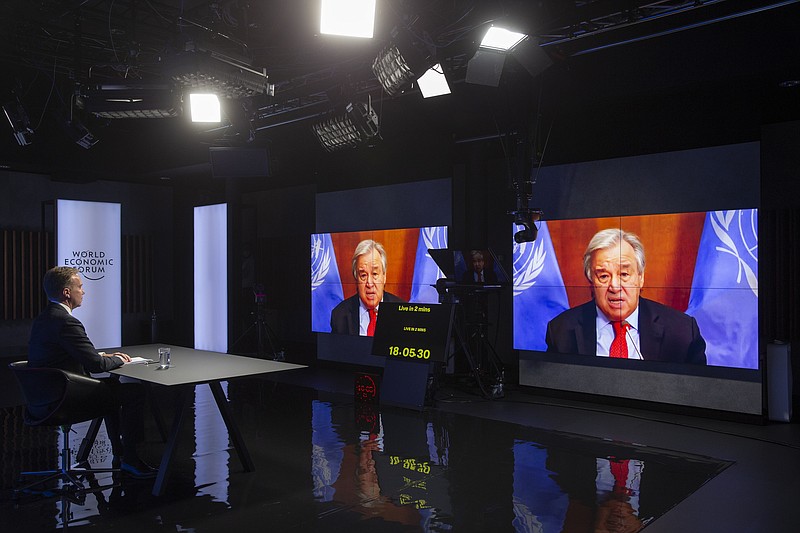NEW YORK -- U.N. Secretary-General Antonio Guterres warned global leaders Monday that the world is facing not only a covid-19 emergency and the worst economic crisis in nearly a century, but also "existential threats" to the climate and biodiversity -- and the possibility of the largest economies, the United States and China, splitting the world in two.
In a wide-ranging speech to the World Economic Forum's virtual Davos Agenda meeting, the U.N. chief said humanity doesn't want to repeat 2020's "tragedy and crisis." However, he pointed to the many fragilities in today's world, also including lack of consensus on using cyberspace and the growing risks of nuclear and chemical proliferation.
"In 2021 we must address these fragilities and put the world on track," Guterres said.
About the pandemic, he warned that rich developed nations "are wrong" to think they will be safe if they vaccinate their own people and neglect the developing world.
"Vaccines must be seen as global public goods -- people's vaccines," he said, and production must be massively scaled up around the world at affordable prices.
Guterres also urged major action to address inequalities highlighted by the pandemic.
He called for liquidity to avoid debt defaults in many middle-income and least-developed countries, debt relief to countries needing it, new Special Drawing Rights to benefit developing countries, measures to close wage gaps and equal participation in global institutions for developing countries.
The U.N. chief also said a covid-19 recovery must help "end our war against nature, avert climate catastrophe and restore our planet."
The main objective for 2021 is to build a global coalition for carbon neutrality, he said.
"Every country, city, financial institution and company needs to adopt credible plans backed by intermediate goals for transitioning to net-zero emissions by 2050, and to take decisive action now to put themselves on the right path," he said.
As for geopolitics, Guterres said he continues "to fear the possibility of a great fracture: the world splitting in two, with the two largest economies on Earth leading two areas with different dominant currencies, trade and financial rules, each with its own internet, and its own zero-sum geopolitical and military strategies."
"We must do everything possible to avert such a division," the U.N. chief stressed.
A GLOBAL EFFORT
Countries must cooperate more closely in fighting the challenges of the pandemic and climate change and in supporting a sustainable global economic recovery, Chinese President Xi Jinping agreed in his own address to the forum.
"Humanity has only Earth and one future," Xi said in remarks from Beijing.
"Fighting the pandemic is the most urgent task facing the international community," Xi said, urging that countries cooperate to conquer the disease, which was first reported in the central Chinese city of Wuhan just over a year ago.
"In particular, we should strengthen cooperation in vaccine research and development, production and distribution, so that vaccines can truly become a public good that are accessible and affordable to people in all countries," he said.
Much of what the Chinese leader said was a reiteration of Beijing's usual stance on issues such as closing the gap between wealthy and developing nations, and warning that countries should not meddle in other countries' affairs.
While Xi did not mention recent U.S. policies directly, he did call for sticking to rules, embracing diversity and avoiding confrontations over trade and technology.
Relations between the U.S. and China have sunk to their worst in decades as former President Donald Trump imposed punitive tariffs and other sanctions to try to gain concessions on trade and counter perennial trade deficits.
"We should advocate fair competition, like competing with each other for excellence in a racing field, not beating each other on a wrestling arena," Xi said.
"To engage in cliques, a new Cold War, exclusion, threats and intimidation against others, to warn of decoupling, cutting off supplies, sanctions at every turn ... can only drive the world to division and even conflict," he said.
"A divided world cannot tackle the common challenges facing humanity, and confrontation will lead humanity to a dead end," Xi said.
Information for this article was contributed by Edith M. Lederer, Elaine Kurtenbach and Liu Zheng of The Associated Press.
